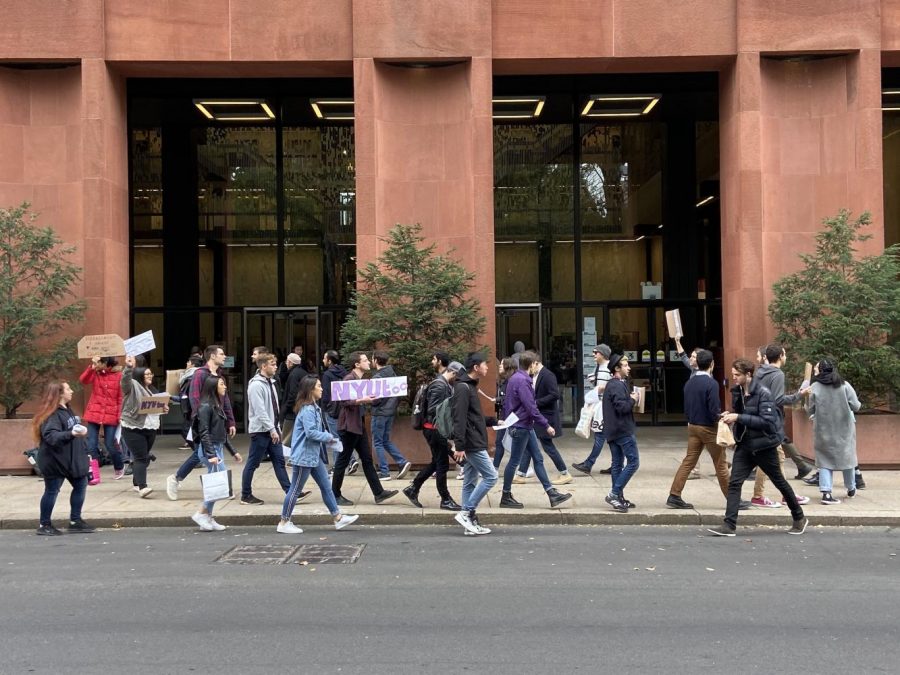NYU appeared on the first composite data report of sexual assault complaints to Title IX offices across all New York college campuses released by the state. The data highlights the problem of underreporting and the unique position universities have in supporting sexual assault survivors, according to the activists who supported the report.
The report is mandated by the “Enough is Enough” legislation passed in 2015 after activist group Students United for Safer Schools drafted and lobbied for the bill in Albany in conjunction with the Carry that Weight campaign. After years of organizing its implementation and non-compliance from universities, the first report of all Title IX complaints from 2018 was released this December. Co-president of Students United for Safer Schools Sejal Singh, who helped to draft “Enough is Enough,” commented on the usefulness of the data.
“I think that data is sort of a powerful illustration of what students need and want and are seeking,” Singh said. “This data helps us to lay out where there are breakdowns at many, many points in the process.”
One of these breakdowns is a lack of trust between student bodies and their schools. NYU’s 173 complaints, despite a student body of over 50,000, reflects a trend of underreporting across the data.
“NYU’s numbers are not reflective of the actual amount of sexual misconduct on campus,” President of Students for Sexual Respect at NYU Emma Levine told WSN in an email. “From what we’ve seen/heard from folks, a lot of that might be due to the fact that the reporting/adjudication process is really difficult emotionally for survivors.”
Zoe Ridolfi-Starr, co-president of Students United for Safer Schools, says that the data can be misleading because of this kind of underreporting.
“You might expect that the schools that are reporting the lowest number of gender violence incidents are doing a great job with addressing gender bias on campus, which is possible,” Ridolfi-Starr said. “But the more likely way, the more realistic way, to interpret that data is in fact that students don’t feel comfortable reporting to those institutions.”
The data highlights the importance of universities supporting survivors switching dorms, changing classes or accessing mental health counselors. Of the 173 who filed Title IX complaints at NYU, all of them requested additional services like these.
The report gathers data on factors including: how many incidents occurred off campus, how many complainants sought university judicial process, how many cases were reported to law enforcement and the outcomes of these cases. Ridolfi-Starr said the data illustrates the role universities should play in supporting sexual assault survivors.
“Schools are required to respond to sexual violence and harassment because of a civil rights statute,” Ridolfi-Starr said. “I think it’s really important for us to know how many of the students are seeking additional services, how many of them are getting it.”
After “Enough is Enough” was passed, NYU began administering campus climate surveys regarding sexual and interpersonal violence every other year, adopted a student’s Bill of Rights, adjusted the university’s definition of affirmative consent to reflect that of the state and began reporting Title IX complaints.
In addition to being in the best position to fill the high demand for resources in the wake of a complaint, universities are also more likely to recieve reports of sexual assault than law enforcement. Drafters of the original legislation were disappointed to see a funding increase for state law enforcement rather than placing the onus on universities’ Title IX offices.
“We envisioned this as a bill addressing gender violence on college campuses,” Ridolfi-Starr said. “And about universities’ unique opportunity and obligation to respond, support students, to prevent violence and respond once that occurred.”
Activists hope that the annual report will be a means to ensure that universities adhere to Title IX. Currently, universities are meant to be financially penalized for violating Title IX, but the state is reluctant to impose financial consequences because they may negatively affect students.
Ridolfi-Starr emphasized the necessity for universities to support survivors of sexual assault, even if their incident occured off-campus. The 2018 report revealed that across all New York State campuses 38% of Title IX complaints occurred off-campus, but new legislation proposed by Betsy DeVos would allow universities to avoid responsibility for these assaults. Because survivors are often unwilling to report to law enforcement, this bill will leave them with nowhere to turn, Ridolfi-Starr said.
However, even if DeVos’ bill is passed, it is unlikely it will affect how NYU supports survivors of sexual assault.
“Even when an incident occurs outside of our jurisdiction, we connect those involved with support, including with specialists to help them walk through the process with law enforcement,” NYU Spokesman John Beckman told WSN in an email.
A version of this article appeared in the Monday, January 27th, 2020, print edition. Email Emily Mason at [email protected].


























































































































































